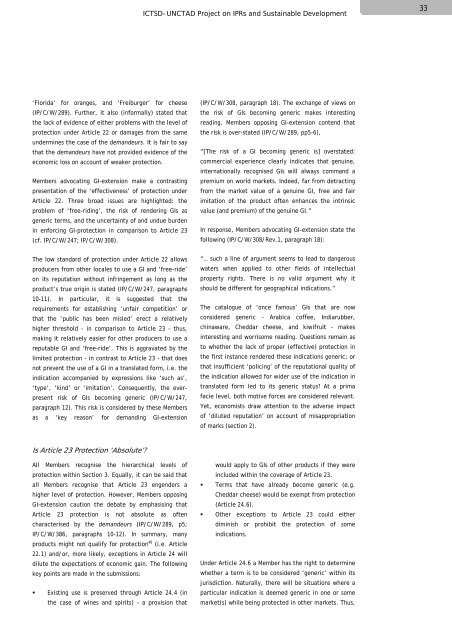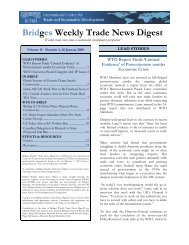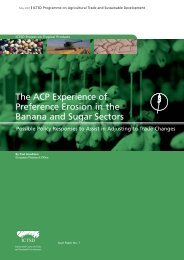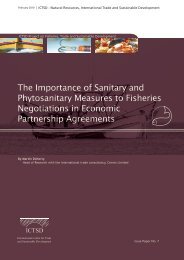Geographical Indications
Geographical Indications
Geographical Indications
Create successful ePaper yourself
Turn your PDF publications into a flip-book with our unique Google optimized e-Paper software.
ICTSD-UNCTAD Project on IPRs and Sustainable Development33‘Florida’ for oranges, and ‘Freiburger’ for cheese(IP/C/W/289). Further, it also (informally) stated thatthe lack of evidence of either problems with the level ofprotection under Article 22 or damages from the sameundermines the case of the demandeurs. It is fair to saythat the demandeurs have not provided evidence of theeconomic loss on account of weaker protection.Members advocating GI-extension make a contrastingpresentation of the ‘effectiveness’ of protection underArticle 22. Three broad issues are highlighted: theproblem of ‘free-riding’, the risk of rendering GIs asgeneric terms, and the uncertainty of and undue burdenin enforcing GI-protection in comparison to Article 23(cf. IP/C/W/247; IP/C/W/308).(IP/C/W/308, paragraph 18). The exchange of views onthe risk of GIs becoming generic makes interestingreading. Members opposing GI-extension contend thatthe risk is over-stated (IP/C/W/289, pp5-6),“[The risk of a GI becoming generic is] overstated:commercial experience clearly indicates that genuine,internationally recognised GIs will always command apremium on world markets. Indeed, far from detractingfrom the market value of a genuine GI, free and fairimitation of the product often enhances the intrinsicvalue (and premium) of the genuine GI.”In response, Members advocating GI-extension state thefollowing (IP/C/W/308/Rev.1, paragraph 18):The low standard of protection under Article 22 allowsproducers from other locales to use a GI and ‘free-ride’on its reputation without infringement as long as theproduct’s true origin is stated (IP/C/W/247, paragraphs10-11). In particular, it is suggested that therequirements for establishing ‘unfair competition’ orthat the ‘public has been misled’ erect a relativelyhigher threshold – in comparison to Article 23 – thus,making it relatively easier for other producers to use areputable GI and ‘free-ride’. This is aggravated by thelimited protection – in contrast to Article 23 – that doesnot prevent the use of a GI in a translated form, i.e. theindication accompanied by expressions like ‘such as’,‘type’, ‘kind’ or ‘imitation’. Consequently, the everpresentrisk of GIs becoming generic (IP/C/W/247,paragraph 12). This risk is considered by these Membersas a ‘key reason’ for demanding GI-extension“… such a line of argument seems to lead to dangerouswaters when applied to other fields of intellectualproperty rights. There is no valid argument why itshould be different for geographical indications.”The catalogue of ‘once famous’ GIs that are nowconsidered generic – Arabica coffee, Indiarubber,chinaware, Cheddar cheese, and kiwifruit – makesinteresting and worrisome reading. Questions remain asto whether the lack of proper (effective) protection inthe first instance rendered these indications generic; orthat insufficient ‘policing’ of the reputational quality ofthe indication allowed for wider use of the indication intranslated form led to its generic status? At a primafacie level, both motive forces are considered relevant.Yet, economists draw attention to the adverse impactof ‘diluted reputation’ on account of misappropriationof marks (section 2).Is Article 23 Protection ‘Absolute’?All Members recognise the hierarchical levels ofprotection within Section 3. Equally, it can be said thatall Members recognise that Article 23 engenders ahigher level of protection. However, Members opposingGI-extension caution the debate by emphasising thatArticle 23 protection is not absolute as oftencharacterised by the demandeurs (IP/C/W/289, p5;IP/C/W/386, paragraphs 10-12). In summary, manyproducts might not qualify for protection 48 (i.e. Article22.1) and/or, more likely, exceptions in Article 24 willdilute the expectations of economic gain. The followingkey points are made in the submissions:! Existing use is preserved through Article 24.4 (inthe case of wines and spirits) – a provision thatwould apply to GIs of other products if they wereincluded within the coverage of Article 23.! Terms that have already become generic (e.g.Cheddar cheese) would be exempt from protection(Article 24.6).! Other exceptions to Article 23 could eitherdiminish or prohibit the protection of someindications.Under Article 24.6 a Member has the right to determinewhether a term is to be considered ‘generic’ within itsjurisdiction. Naturally, there will be situations where aparticular indication is deemed generic in one or somemarket(s) while being protected in other markets. Thus,









